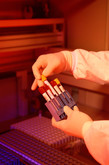Generics
FDA approves generic prescription-only version of Plan B emergency contraceptive levonorgestrel for women ages 17 and under
The US FDA on 24 June 2009 approved the first generic version of the emergency contraceptive Plan B (levonorgestrel) tablets, 0.75 mg. The generic product will be available by prescription only for women ages 17 and under.
Safety and compliance fears delay UK’s generics substitution
Plans to allow pharmacists to save the UK’s National Health Service (NHS) money by overruling doctors' prescriptions for branded medicines have been delayed after concerns about patient safety and compliance.
Big pharmaceutical firms start to embrace generics
President Barack Obama recently posed an existential question to those around him. “If there’s a blue pill and a red pill, and the blue pill is half the price of the red pill and works just as well, why not pay half the price for the thing that’s going to make you well?” Thus he captured one of two powerful global trends forcing pharmaceutical giants to look for a new business model.
US and EU get tough on 'pay-for-delay’ deals
Forces are aligning against ‘pay-for-delay’ patent deals, reported FiercePharma. After years of expressing contempt for the US Federal Trade Commission's (FTC) fight against the deals, the US Department of Justice (DOJ) has now signed up to the cause. In an appellate court filing, the DOJ said that it is unlawful for branded drugmakers to pay generic firms to stand down from patent challenges – unless the drugmakers can justify the deal.
Brand-name drugs are not more effective than generic versions for treating cardiovascular disease
A recent review in Evidence-Based Medicine by Dr Braden Manns of the University of Calgary in Canada studies the question whether generic drugs are as effective as brand-name drugs for treating cardiovascular disease.
Generic drug companies adapt to survive
The prospects seem bright for generics companies. Healthcare systems are increasingly looking for ways to cut costs, and patents are expiring on a growing number of medicines produced by innovative pharmaceutical companies. Yet recent forces have intensified not only the traditional tensions between the generic producers and their innovative rivals, but also among the generic companies themselves. Therefore the mood of many of the delegates at the European Generic medicines Association annual meeting recently held in Barcelona, Spain, was gloomy, as reported by Mr Andrew Jack in the Financial Times.
Conflicting interpretations of data exclusivity and non-authorised medicinal products
The European Court of Justice (ECJ) has handed Shire Plc and Janssen-Cilag Ltd, a Johnson & Johnson (J&J) company, a victory against Generics [UK] Ltd in a case involving the Alzheimer's treatment Reminyl. The court's ruling is in line with the rejection of Generics UK’s marketing authorisation for a form of galantamine by the UK's Medicines and Healthcare products Regulatory Agency (MHRA). The MHRA decision was based in part on an attempt by the generic-drug maker to reference a drug approved in Austria in 1963. The marketing authorisation for Nivalin (galantamine), the drug Generics UK referenced, was not updated after Austria joined the EU to comply with European Community law and cannot be used as a reference product. Nivalin was sold by Waldheim Pharmazeutika, which had approval to market the drug as a treatment for polio until 2001. Janssen-Cilag entered into an agreement with Waldheim to gain marketing authorisation for galantamine in 2000, to be sold under the brand Reminyl for Alzheimer's disease.
EvaluatePharma: Generic players impress in the first half
Which pharma firm is the most profitable? A new analysis of net margins by EvaluatePharma tagged companies for profitability, and the winner was not one of the big pharma companies, e.g. Johnson & Johnson or Pfizer, but PDL BioPharma:
FTC and Teva disagree on 'pay-for-delay' deals savings
In a speech on 23 June 2009 before the Center for American Progress in Washington, DC, USA, Federal Trade Commission (FTC) Chairman Jon Leibowitz said that an internal FTC analysis projects that stopping collusive ‘pay-for-delay’ settlements between brand and generic pharmaceutical firms would save consumers US$3.5 billion (Euros 2.5 billion) a year and also reap significant savings for the federal government, which pays approximately one-third of all prescription drug costs. Mr Leibowitz urged Congress to pass pending legislation to ban or restrict such anticompetitive patent settlements, in which manufacturers of brand-name drugs pay potential generic competitors to stay out of the market, as a way to control prescription drug costs, restore the benefits of generic competition, and help pay for healthcare reform.
Teva looking for ‘major’ acquisition
Just a year after swallowing the US$7.4 billion (Euros 5.3 billion) Barr Laboratories buy, Teva Pharmaceutical Industries is ready for another ‘major’ acquisition and may look beyond generic drugs for the purchase, CEO, Mr Shlomo Yanai, said. According to him, Teva is seeking targets to diversify in branded medicines as well as increase its market share in generic drugs. “If we find a target that is in line with our strategy in the specialty area, in the biotechnology area, we definitely are going to consider it,” Mr Yanai said. “We are not limiting ourselves to buying only generic companies.” He declined to name possible targets.






